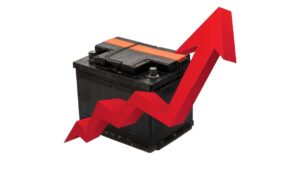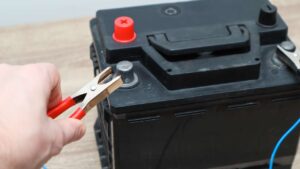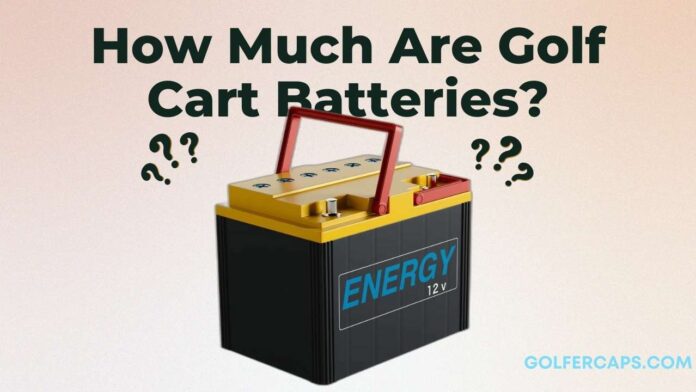Golf carts are indispensable vehicles for navigating sprawling golf courses and are increasingly becoming popular for recreational and utility purposes in various settings. However, one crucial component that keeps these carts running smoothly is the battery. If you’re wondering, “How much are golf cart batteries?” – you’re not alone. Let’s delve into the factors influencing their prices and what you can expect to pay.
we will explore:
- How Much Are Golf Cart Batteries?
- How much do 48v golf cart batteries cost?
- 36-volt golf cart battery price
- Tips for Battery Maintenance
- How to negotiate to buy a golf cart battery?
Table of Contents
ToggleTypes of Golf Cart Batteries
Lead-Acid Batteries:
1. Flooded Lead-Acid Batteries:
- Description: Flooded lead-acid batteries are the most common type used in golf carts.
- Construction: They contain a liquid electrolyte solution of sulfuric acid and water, which is free to move within the battery.
- Maintenance: Requires periodic watering to replenish electrolyte levels.
- Affordability: Generally more affordable upfront compared to other types of batteries.
- Performance: Provide reliable performance and are suitable for most golf cart applications.
2. Sealed Lead-Acid Batteries (AGM, Gel):
- Description: Sealed lead-acid batteries are maintenance-free and sealed to prevent spillage.
- Construction: Utilize Absorbent Glass Mat (AGM) or Gel technology to immobilize the electrolyte.
- Maintenance: No watering is required, reducing maintenance efforts.
- Safety: Less prone to leaks and spills, making them safer for indoor use.
- Longevity: Offers longer lifespan compared to flooded lead-acid batteries.
- Cost: Generally more expensive upfront due to advanced technology.
Lithium-Ion Batteries:
1. Lithium Iron Phosphate (LiFePO4) Batteries:
- Description: LiFePO4 batteries are a popular choice for golf carts due to their superior performance and efficiency.
- Energy Density: Provide higher energy density, resulting in lighter weight and smaller size compared to lead-acid batteries.
- Longevity: Offers a longer lifespan with thousands of charge cycles, reducing the need for frequent replacements.
- Fast Charging: Can be charged quickly, allowing for shorter charging times and increased productivity.
- Maintenance: Minimal maintenance is required, with no need for watering or regular maintenance tasks.
- Cost: Higher initial investment but offers long-term cost savings due to durability and efficiency.
2. Lithium Cobalt Oxide (LiCoO2) Batteries:
- Description: LiCoO2 batteries are another type of lithium-ion battery used in some golf cart applications.
- Energy Density: Provide high energy density, allowing for compact and lightweight designs.
- Performance: Offer excellent performance with high discharge rates and stable voltage output.
- Safety: Require built-in safety mechanisms to prevent overcharging and overheating.
- Compatibility: This may require modifications to the golf cart’s electrical system due to different voltage requirements.
- Cost: Generally more expensive upfront compared to lead-acid batteries but offers long-term savings in terms of efficiency and lifespan.
Read also: How Much Are Golf Carts?
Average Cost of Golf Cart Batteries
Lead-acid batteries are the more affordable option, with prices ranging from $100 to $300 per battery, depending on factors like capacity and brand. On the other hand, lithium-ion batteries can cost anywhere from $500 to $1500 or more, reflecting their advanced technology and superior performance.
How Much Are Golf Cart Batteries?

The price of golf cart batteries depends on the type of battery you choose. There are two main options:
-
Lead-acid batteries: These are the most common type of golf cart battery, and they are also the most affordable. A set of lead-acid batteries will typically cost between $800 and $1,500.
-
Lithium-ion batteries: Lithium-ion batteries are more expensive than lead-acid batteries, but they offer several advantages, such as a longer lifespan and faster charging times. A set of lithium-ion golf cart batteries can cost anywhere from $1,000 to $3,000.
So, to answer your question directly, golf cart batteries can cost anywhere from $800 to $3,000 depending on the type of battery you choose.
How much do 48v golf cart batteries cost?

48v golf cart batteries themselves aren’t typically sold individually, but rather in sets that power the entire cart. The cost depends on factors like:
- Battery type:
- Lead-acid (most common, affordable): $800 – $1,500
- Lithium-ion (longer lifespan, faster charging): $1,000 – $3,000
- Brand, quality, and capacity: Higher quality and higher capacity batteries will cost more.
So, while you won’t find a price for a single 48v battery, expect to pay between $800 and $3,000 depending on the type you choose.
36-volt golf cart battery price
36-volt golf cart battery prices can vary depending on the type and specific features:
-
Lead-acid batteries (most common): These are the most budget-friendly option, typically ranging from $799 to $899 for a set [search 36v golf cart battery price].
-
Lithium-ion batteries (better performance): These offer advantages like longer lifespan and faster charging, but come at a higher cost. Expect to pay $589 to $2,099 for a set, depending on capacity [search 36v lithium golf cart battery price].
Here’s a breakdown to help you estimate:
- Lower-priced range (around $799): This might be for a set of lead-acid batteries with standard capacity.
- Mid-range (around $899 – $1,500): This could be for a set of higher-capacity lead-acid batteries or a basic lithium-ion option.
- Higher-priced range (above $1,500): This is likely for premium lithium-ion batteries with extended capacity or advanced features.
Remember, these are ballpark figures. It’s always best to consult with a golf cart battery retailers or manufacturers for specific pricing based on your requirements.
Read also: How Much Does a Golf Cart Weigh?
Cost Factors
Several factors influence the cost of golf cart batteries. The type of battery you choose is a significant determinant. Lead-acid batteries tend to be more budget-friendly upfront, while lithium-ion batteries come with a higher initial investment but offer long-term savings due to their durability and efficiency.
Brand reputation also plays a crucial role in pricing. Established brands with a history of reliability may command higher prices compared to lesser-known manufacturers. Additionally, the battery’s capacity, measured in ampere-hours (Ah), affects its price, with higher-capacity batteries typically costing more.
Maintenance requirements should also be considered. Batteries that require minimal upkeep may have a higher upfront cost but can save you money in the long run by reducing maintenance expenses.
Factors Affecting Battery Lifespan
Several factors impact the lifespan of golf cart batteries. Your charging habits play a crucial role – frequent deep discharges can shorten battery life, while regular, shallow charging cycles are optimal for longevity. Additionally, proper maintenance practices such as keeping the battery terminals clean and checking fluid levels regularly can extend its lifespan. Environmental conditions, such as extreme temperatures, can also affect battery performance and longevity.
Where to Buy Golf Cart Batteries
You can purchase golf cart batteries from various sources, including local dealerships, online retailers, and specialty stores. Local dealerships often provide personalized service and expert advice but may have a limited selection. Online retailers offer convenience and a wide range of options, while specialty stores may cater specifically to golf cart owners, offering specialized products and services.
Comparison of Popular Brands
When shopping for golf cart batteries, you’ll encounter several popular brands, each with its reputation and pricing. Trojan, Duracell, Interstate, and Exide are among the most well-known brands in the market, known for their quality and reliability. Comparing prices, warranties, and customer reviews can help you make an informed decision.
Tips for Battery Maintenance

Maintaining your golf cart batteries is crucial for ensuring optimal performance and longevity. Here are some essential tips for battery maintenance:
Regular Charging:
1. Charge After Each Use:
- Importance: Regular charging prevents deep discharges, which can shorten battery life.
- Practice: Charge your golf cart batteries after each use, even if they are not fully depleted, to maintain optimal charge levels.
2. Avoid Overcharging:
- Risk: Overcharging can lead to electrolyte loss and reduce battery lifespan.
- Prevention: Use a smart charger with automatic shut-off or a timer to prevent overcharging.
Cleaning and Inspection:
3. Clean Battery Terminals:
- Purpose: Clean terminals ensure a good connection and prevent corrosion buildup.
- Method: Use a mixture of baking soda and water to clean terminals and a wire brush to remove corrosion.
4. Check Fluid Levels:
- Maintenance: For flooded lead-acid batteries, check electrolyte levels regularly.
- Top-up: Add distilled water as needed to maintain proper electrolyte levels, ensuring plates are always submerged.
Storage:
5. Store Batteries Properly:
- Environment: Store batteries in a cool, dry place away from extreme temperatures and moisture.
- Condition: Avoid storing batteries in a discharged state, as this can lead to sulfation and irreversible damage.
6. Disconnect Batteries During Storage:
- Precaution: Disconnect battery cables or use a disconnect switch when storing the golf cart for an extended period.
- Purpose: Prevents parasitic loads and extends battery life by reducing self-discharge.
Handling:
7. Handle Batteries with Care:
- Safety: Wear protective gloves and eyewear when handling batteries to avoid contact with acid.
- Lifting: Use proper lifting techniques and equipment to prevent injury, as batteries can be heavy.
Preventive Maintenance:
8. Perform Regular Inspections:
- Visual Inspection: Check for signs of damage, leaks, or bulging on the battery casing.
- Electrical Testing: Test battery voltage and specific gravity periodically to assess health and performance.
9. Follow Manufacturer Guidelines:
- Recommendations: Adhere to maintenance schedules and guidelines provided by the battery manufacturer.
- Documentation: Keep records of maintenance activities, including dates of charging, inspections, and any repairs or replacements.
How to negotiate to buy a golf cart battery?

Negotiating for the purchase of golf cart batteries can be a strategic process that involves understanding your needs, researching prices, and effectively communicating with sellers. Here’s a step-by-step guide on how to negotiate for buying golf cart batteries:
1. Research Prices:
1. Compare Prices:
- Research prices from various sources, including local dealerships, online retailers, and specialty stores.
- Compare prices for different battery types, brands, and capacities to understand the market range.
2. Identify Discounts or Promotions:
- Look for discounts, promotions, or bundle deals offered by sellers, especially during off-season or promotional periods.
- Check for manufacturer rebates or incentives that can lower the cost of batteries.
2. Determine Your Budget and Needs:
1. Set a Budget:
- Determine how much you are willing to spend on golf cart batteries based on your budget and priorities.
- Consider the long-term costs and benefits of different battery types and capacities.
2. Assess Your Requirements:
- Evaluate your golf cart’s power requirements, usage patterns, and environmental conditions to determine the appropriate battery type and capacity.
- Consider factors such as battery lifespan, charging time, and maintenance requirements.
3. Gather Information:
1. Request Quotes:
- Contact multiple sellers and request quotes for the specific battery model or capacity you are interested in.
- Provide details about your requirements and inquire about additional services or warranties included in the price.
2. Ask Questions:
- Seek clarification on product specifications, warranty terms, and any additional fees or charges.
- Inquire about available payment options, delivery or installation services, and return policies.
4. Negotiate:
1. Start with a Reasonable Offer:
- Make an initial offer based on your research and budget, aiming for a price slightly lower than the quoted price.
- Highlight any competitive offers or price-matching opportunities to leverage negotiations.
2. Highlight Value Proposition:
- Emphasize the benefits of doing business with you, such as the potential for repeat purchases, referrals, or bulk orders.
- Showcase your willingness to commit to a long-term relationship with the seller.
3. Negotiate Terms:
- Negotiate not only the price but also additional terms such as warranty coverage, installation services, or maintenance packages.
- Propose alternatives or compromises to reach a mutually beneficial agreement.
5. Close the Deal:
1. Reach an Agreement:
- Work with the seller to find common ground and finalize the terms of the purchase agreement.
- Ensure that all agreed-upon terms are documented in writing, including price, warranty, delivery arrangements, and payment terms.
2. Confirm Details:
- Double-check product specifications, quantities, and delivery dates to avoid any misunderstandings or discrepancies.
- Verify the seller’s credentials and reputation to ensure reliability and trustworthiness.
3. Seal the Deal:
- Make the necessary arrangements for payment, delivery, or pickup of the batteries as per the agreed-upon terms.
- Obtain a receipt or invoice for the purchase and keep it for your records.
Eco-Friendly Alternatives
For environmentally conscious consumers, there are eco-friendly alternatives to traditional golf cart batteries. Solar-powered batteries harness energy from the sun to charge, reducing reliance on grid electricity and lowering operating costs. Additionally, some manufacturers offer recycled batteries, which are refurbished and repurposed, reducing waste and environmental impact.
Conclusion
Investing in high-quality golf cart batteries is essential for ensuring optimal performance and longevity of your vehicle. While the cost may vary depending on factors like battery type, brand, and capacity, prioritizing quality and reliability can ultimately save you time and money in the long run. By understanding the factors that influence battery prices and implementing proper maintenance practices, you can enjoy the smooth and efficient operation of your golf cart for years to come.
FAQs:
- Are lithium-ion batteries worth the higher cost?
While lithium-ion batteries may have a higher upfront cost, they offer several advantages such as longer lifespan, faster charging, and lighter weight, making them a worthwhile investment for many golf cart owners.
- How often should I charge my golf cart batteries?
It’s recommended to charge your golf cart batteries after each use to prevent deep discharges and prolong their lifespan. Avoid letting the batteries sit in a discharged state for extended periods.
- Can I mix and match different brands of batteries in my golf cart?
It’s not recommended to mix different brands or types of batteries in the same golf cart, as it can lead to uneven charging and potential damage to the batteries. Stick to using batteries from the same manufacturer and type for optimal performance.
- What is the warranty period for golf cart batteries?
Warranty periods vary depending on the manufacturer and type of battery. Lead-acid batteries typically come with warranties ranging from 1 to 5 years, while lithium-ion batteries may have warranties of 5 years or more.
- How can I dispose of old golf cart batteries responsibly?
Old golf cart batteries should be recycled properly to prevent environmental pollution. Many local recycling centers and automotive stores offer battery recycling programs where you can drop off old batteries for safe disposal.










